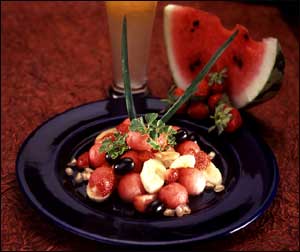
Your fingers swell and your rings get stuck. Your ankles look and feel like a
pair of mighty tree trunks. Pants fit tighter, and your bra may become
uncomfortably snug. Sounds familiar?
Most
of us experience this because of water retention, especially around one week
before menstruation. Even the headaches and back pain of premenstrual syndrome
(PMS) are associated with water retention and have been traced to excess fluid
in the discs between the vertebrae and the spine, as well as inside the skull.
Why
Do We Get Waterlogged?
Many
factors can knock our system out of balance, leaving excess fluid in our tissues
and causing a condition called oedema.
They
are:
• A
high-sodium diet packed with processed foods and salty snacks.
• A
high-salt diet pumps extra sodium into your blood and body fluids. The mechanism
that pushes water out of your cells is disturbed and the cells hold onto extra
water. This will cause water retention whether there's a hormonal imbalance or
not, and whether you're a woman or a man.
• The
premenstrual syndrome in certain women makes them retain water.
• Hormonal
changes that occur one week before menstruation can cause bloating, weight gain
and water retention.
• The
later stages of pregnancy.
A
woman may also experience swollen ankles because the baby is pressing against
veins in her abdomen, hindering blood flow back from the legs and increasing
pressure.
• Heart
failure. This is one of the more serious causes of retention in which the
pressure of blood backing up in the veins forces more fluid into tissues.
• Kidney
problems. These can also lead to water retention. If the kidneys fail, salt can
accumulate in the body and attract water.
• Protein
deficiencies, tumours and cirrhosis of the liver. These may also lead to
bloating and swelling.
Some
medications, including steroids and birth control pills high in oestrogen. These
also cause water retention because they act on the kidneys to retain more
sodium.
Get
The Bloat Out!
Experts
say the following tips will help ease that waterlogged feeling:
• Reduce
Sodium
Daily
sodium intake should be about 2,000 mg (one teaspoon of salt). This can be got
done from:
• Cutting
down on papads, pickles and chutneys, staying away from any pre-packaged food
(potato chips, 'farsans' - 'chivda', 'sev', 'chakli', etc), preserved meats
(bacon and ham) and processed foods, particularly canned and frozen foods.
• Stalling
the shaker - stay away from the salt shaker when you're at the table. Try a salt
substitute or experiment with herbs and spices for added flavour.
• Snack
on fresh fruits and vegetables instead. Besides cutting down on sodium, you will
also reduce the fat in your diet and add fibre and nutrients.
Increase
Potassium
Two
of the most important minerals your body uses to help regulate fluids are sodium
and potassium. For optimal fluid regulation, your body needs to have a proper
balance of both. An imbalance, especially less potassium, can raise your blood
pressure and your potential for fluid retention. You can double your potassium
intake to about 5,000 mg a day by consuming foods such as fruits and vegetables
(three to five servings each).
Take
Calcium
Researchers
have found that women who take 1,000 mg and above of calcium a day have fewer
water retention and other PMS symptoms. So, eat calcium-rich diets and take
calcium supplements every day.
Try
Vitamin B6
Vitamin
B6 helps the body remove excess amounts of hormones like oestrogen and
progesterone that may be present during the premenstrual period. It relieves
breast tenderness, headaches and weight gain. Foods high in this vitamin are
bananas, chicken, milk, fish, soyabeans, whole grains, cereals, wheat germ,
brown rice, fortified breakfast cereals, liver and meat. Also, ask your doctor
for a Vitamin B complex supplement.
Eat
Small Meals
If
water retention occurs in the days before your period begins, try eating small
meals spaced about three hours apart. These meals should be rich in starchy
foods like, 'rotis', breads, crackers, pasta, cereals, potatoes and rice, to
maintain steady blood sugar levels.
Increase
Your Fluid Intake
Ironically,
the most common cause of fluid retention is actually lack of fluids in the body.
Try drinking more water. Your body may be hesitant to release water because you
are not putting any in.
Try
A Natural Diuretic
Drink
pink grapefruit juice or lemon in water. This will force your cells to let go of
extra water. Beware of drugstore diuretics and avoid caffeine as far as
possible. Too much of it can make you jittery, and also rob your body of calcium
and iron.
Get
Active
The
more active you are, the more water you get rid of. Exercise widens blood
vessels, increasing the amount of fluid that goes to the kidneys to be excreted.
A half-hour of exercise three times a week will help your body get rid of excess
water.
Madhavi
Trivedi is a Nutritionist and Healthcare Consultant



